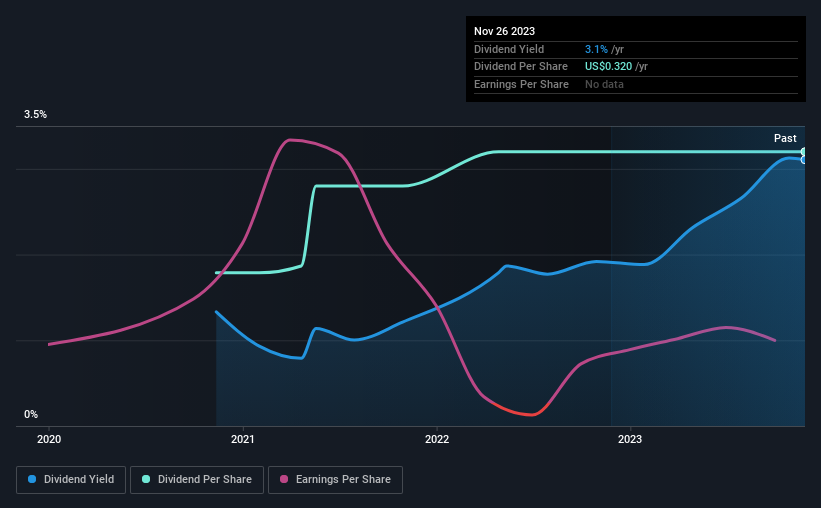- United States
- /
- Banks
- /
- NasdaqCM:BAFN
Is It Smart To Buy BayFirst Financial Corp. (NASDAQ:BAFN) Before It Goes Ex-Dividend?

BayFirst Financial Corp. (NASDAQ:BAFN) stock is about to trade ex-dividend in three days. The ex-dividend date is one business day before a company's record date, which is the date on which the company determines which shareholders are entitled to receive a dividend. The ex-dividend date is an important date to be aware of as any purchase of the stock made on or after this date might mean a late settlement that doesn't show on the record date. Thus, you can purchase BayFirst Financial's shares before the 30th of November in order to receive the dividend, which the company will pay on the 15th of December.
The company's next dividend payment will be US$0.08 per share, on the back of last year when the company paid a total of US$0.32 to shareholders. Calculating the last year's worth of payments shows that BayFirst Financial has a trailing yield of 3.1% on the current share price of $10.3. Dividends are a major contributor to investment returns for long term holders, but only if the dividend continues to be paid. So we need to check whether the dividend payments are covered, and if earnings are growing.
Check out our latest analysis for BayFirst Financial
Dividends are typically paid out of company income, so if a company pays out more than it earned, its dividend is usually at a higher risk of being cut. BayFirst Financial is paying out just 24% of its profit after tax, which is comfortably low and leaves plenty of breathing room in the case of adverse events.
Generally speaking, the lower a company's payout ratios, the more resilient its dividend usually is.
Click here to see how much of its profit BayFirst Financial paid out over the last 12 months.

Have Earnings And Dividends Been Growing?
Companies that aren't growing their earnings can still be valuable, but it is even more important to assess the sustainability of the dividend if it looks like the company will struggle to grow. If business enters a downturn and the dividend is cut, the company could see its value fall precipitously. It's not encouraging to see that BayFirst Financial's earnings are effectively flat over the past five years. We'd take that over an earnings decline any day, but in the long run, the best dividend stocks all grow their earnings per share.
Another key way to measure a company's dividend prospects is by measuring its historical rate of dividend growth. BayFirst Financial has delivered 21% dividend growth per year on average over the past three years.
The Bottom Line
Has BayFirst Financial got what it takes to maintain its dividend payments? BayFirst Financial has seen its earnings per share stagnate in recent years, although the company reinvests more than half of its profits in the business, which could bode well for its future prospects. In summary, BayFirst Financial appears to have some promise as a dividend stock, and we'd suggest taking a closer look at it.
While it's tempting to invest in BayFirst Financial for the dividends alone, you should always be mindful of the risks involved. For instance, we've identified 3 warning signs for BayFirst Financial (1 can't be ignored) you should be aware of.
A common investing mistake is buying the first interesting stock you see. Here you can find a full list of high-yield dividend stocks.
Valuation is complex, but we're here to simplify it.
Discover if BayFirst Financial might be undervalued or overvalued with our detailed analysis, featuring fair value estimates, potential risks, dividends, insider trades, and its financial condition.
Access Free AnalysisHave feedback on this article? Concerned about the content? Get in touch with us directly. Alternatively, email editorial-team (at) simplywallst.com.
This article by Simply Wall St is general in nature. We provide commentary based on historical data and analyst forecasts only using an unbiased methodology and our articles are not intended to be financial advice. It does not constitute a recommendation to buy or sell any stock, and does not take account of your objectives, or your financial situation. We aim to bring you long-term focused analysis driven by fundamental data. Note that our analysis may not factor in the latest price-sensitive company announcements or qualitative material. Simply Wall St has no position in any stocks mentioned.
About NasdaqCM:BAFN
BayFirst Financial
Operates as the bank holding company for BayFirst National Bank that provides community banking services for small and medium sized businesses and individuals.
Flawless balance sheet with proven track record.
Market Insights
Community Narratives



